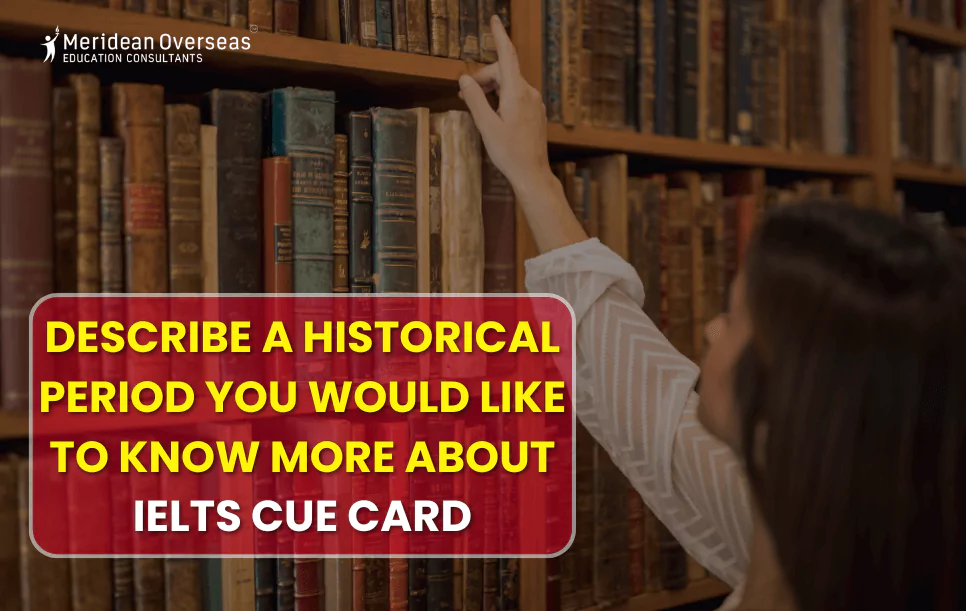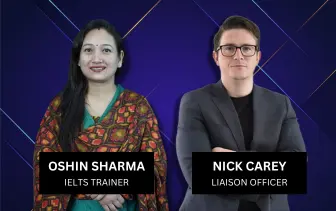
Announcements

Announcements

Meridean Overseas
Updated On 04 May 2024 & Read Time 8 minutes
9.2k
IELTS speaking exam consists of 3 sections: the introduction, the cue card round and the follow-up discussion round. A time period of one minute will be given to prepare for the cue card topic. Then, you have to discuss the topic for two to three minutes. After that, the examiner will ask follow-up questions based on the given cue card topic.
Here, we will discuss one IELTS Speaking cue card topic: “Describe a historical period you would like to know more about”. So, you must prepare for the topic and respond appropriately in cue cards. Read the blog below and know the sample answers for “Describe a historical period you would like to know more about”.
Table of Contents
In India, after the 10th, you must choose the subjects you want to study. I chose history as my subject because I was keen on learning more about the history of India. Today, I am thrilled to share the historical period I am most excited to delve into. The thrill of exploring the past, the excitement of uncovering new narratives, and the joy of understanding our roots are the emotions that drive my passion for history.

I wanted to study the Mohenjo Daro civilization, also known as the Harappan civilisation, which occurred around 2500 BCE. Little did I know that the Mohenjao Daro civilization is the largest Indus Valley civilization and one of the world’s earliest major cities. The Harappan people were known for their advanced urban planning, with well-structured streets and houses and a sophisticated drainage system ahead of its time. All these things have drawn my attention to the historical period of Mohenjo Daro and made me interested in learning more about it.
I want to know more about people's past lives, occupations, trading methods and other things.
I am particularly fascinated to learn how people practically built their houses with efficient drainage systems at that time.
For this, I have to read more historical books and research papers and visit the museum to learn about artefacts that were discovered during excavations because they tell the story of how people used to live earlier.
History has always captivated me. Every time I delve into the history of Mohenjo Daro, I am struck by a new narrative. It is undeniably one of the most pivotal eras of Indian history.
Get free IELTS Sample Papers to learn the type of questions asked in the IELTS (Speaking, writing, reading, and listening) section.
Get Your Free GuideI have always loved listening to stories from the past, whether through podcasts and radio or reading books. Every night before bed, I listen to or read stories from history. I like to learn about the culture, battles and revolutions that have taken place in our history.
Today, I will discuss the Age of Exploration, which lasted from the 15th to 17th century and was defined by a series of voyages of discovery undertaken by European explorers. This period of exploration led to discoveries of trade routes.
I want to know more about the Age of Exploration for various reasons. I am amazed by the work and dedication of the expedition leaders and I am eager to learn about the cultural exchange that took place during that period.
I can learn more about the Age of Exploration in various ways, one of which is through reading books and research papers. Another is listening to podcasts about the historical period of the Age of Exploration. I can also visit museums or watch movies related to it. Additionally, I can engage in interactive online courses or join historical societies to deepen my understanding.
Also, read: Describe an exciting activity that you experienced with someone else
The Age of Exploration was a historic moment in history. By reading, listening, or visiting places that describe that period, I may better comprehend it and the people who formed it. Understanding history is not just about knowing the past but also about understanding the present and shaping the future.
Embark and excel in your study abroad journey with our expert team!

From the late 18th to the early 19th century, there was a notable change observed in item manufacturing and distribution processes. Before the Industrial Revolution, most products were created by hand in little stores or houses.
I want to know about the Industrial Revolution, a significant historical turning point. The Industrial Revolution affected human life in almost every aspect, good or bad, whether it was the invention of the steam engine or the establishment of factories.
The Industrial Revolution impacted our society and significantly changed how people lived, worked and talked to each other. For instance, the growth of factories led to urban centres where workers could work and live together. These changes led to new social and cultural norms as people from different backgrounds and regions came together in these centres. I find it fascinating to imagine these new urban landscapes' bustling streets and the vibrant mix of cultures.
I can learn about this through books and manuscripts written then or by visiting places like museums, where local publishers have preserved history.
The Industrial Revolution led to the development of cities and a rise in living standards for many individuals. The development of factories and technologies like the steam engine increased pollution and environmental degradation, negatively affecting health.
Also, read: Describe a place you visited where the air was polluted - IELTS Cue Card
Question: How can people get authentic historical information?
Answer: Historical books, scripters and museums preserve history in all its forms, which may provide people with accurate knowledge. The internet can also provide information regarding historical people and facts. These artefacts and museums are repositories of the past and guardians of our collective memory, reminding us of our journey and heritage.
Question: Many children tend to get bored with history because there are many dates, times and names to remember. Do you agree with that?
Answer: Children today are less interested in kings and queens or battles and more interested in the future. Their passions include movies, sports, fashion and technology. Thus, they find history boring.
Question: Should museums be free of cost to enter?
Answer: No, they should not be completely free, otherwise, it will be challenging to maintain the items. There should be some sort of entry fee.
Question: How might the museums of the future portray the 21st century?
Answer: The museum will show the twenty-first century as the most imaginative era, which has seen a pandemic and many technologies that have radically changed human existence. Visitors will have access to all current technology.
Question: How do you think museums benefit society?
Answer: The purpose of museums is to educate and inform the public. Academic learning is a museum's educational advantage. In addition to providing ties to history, museums also serve as the guardians of the past. It is intriguing for kids to hear the tales told in museums since they are full of them.
Also, read: Talk about an interesting old person you met recently - IELTS Cue Card
Question: Do you think it is essential to learn from history?
Answer: Yes, we can learn about our customs, cultural rituals and festivals and their significance. We must preserve our culture and rich heritage and pass it on to the next generation. We need to know who we are, and the freedom we enjoy is not easily obtained.
Boost your IELTS score with effective practice using these sample papers.
Get Your Free Guide
Although our history is full of surprises, every country and every city has its history. Some are still present there and some were destroyed during wars or when kings or invaders destroyed a few places. The essence is in preserving what we have now, and passing it on to the future generations to cherish.
If you need further assistance preparing for your IELTS speaking test or have any queries about studying abroad, please contact our expert counsellors at Meridean Overseas Education Consultants (MOEC). We offer free online counselling through our website and can help you with admission and visa processes. Our expert counsellors will also assist you in shortlisting universities based on your profile. For more information, contact application02@meridean.org or 1800-1230-00011.

Contact MOEC Experts for Study Abroad Guidance!
By using our site, you agree to our use of cookies.

Hurry up before admissions close.


.png)












